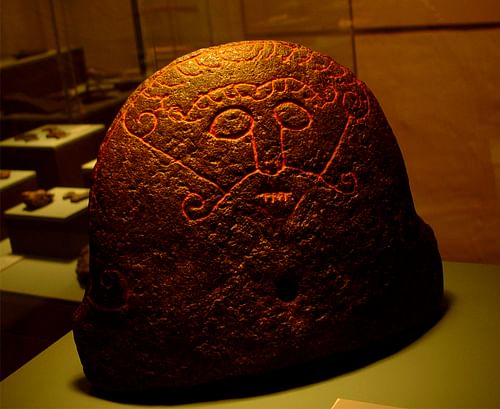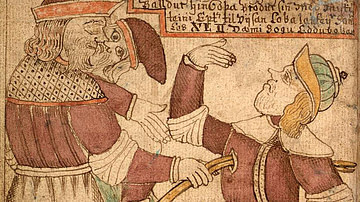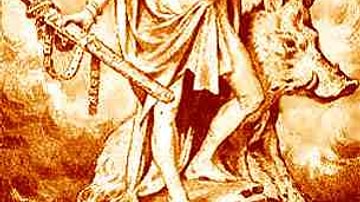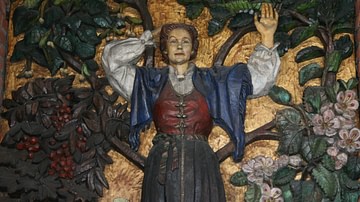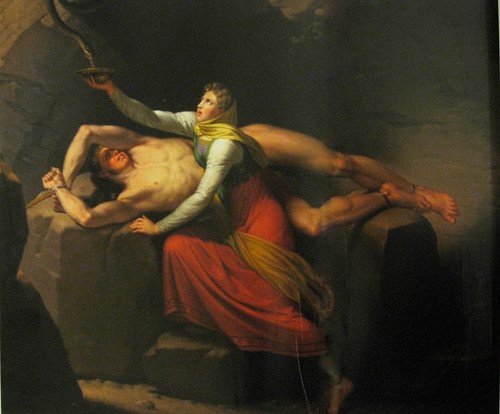
Loki is a god in Norse mythology who is often simply described as the 'trickster' god for his love of playing pranks on both his fellow gods and his or their opponents. Sworn brother of Odin and often the one to dig the other gods out of inconveniently deep holes, Loki's name nonetheless has many negative connotations due to his deceitful nature and especially the hand he had in the death of the god Baldr, thus setting in motion the coming of the Ragnarök (the 'final destiny of the gods' in which the world is destroyed). With no cult attached to him and no clear function in Viking Age belief, yet being one of only three gods who headlines in more than one myth (the other two being Odin and Thor), Loki takes up a unique spot in the Norse pantheon.
The sources
The richest amount of information on Loki can be mined from Snorri Sturluson's Prose Edda (c. 1220 CE, one of our main sources on Norse mythology) – albeit seen through the goggles of a 13th-century CE Icelandic mythology geek from a time Christianity had already taken hold of the island. Loki also pops up in some very early skaldic poems (Viking Age, pre-Christian poetry mainly heard at courts by kings and their retinues) composed between the late 9th and early 11th centuries CE as well as in the Lokasenna and the Þrymskviða poems from the Poetic Edda (c. 1270 CE, but containing material which probably dates back to before the 10th century CE in the Viking Age proper). However, he is loud in his absence from arguably some of the oldest poems from this work, the Vafþrúðnismál and the Grímnismál. Coupled with this, Loki's similarly surprising non-existence in Saxo Grammaticus' Gesta Danorum ('Deeds of the Danes', composed in the early 13th century CE), a Danish work which otherwise extensively discusses Norse mythology, might indicate that Loki was more of a regional feature rather than being omnipresent throughout the Germanic World. Indeed, sources on Loki are limited to the northern Germanic regions and Loki himself has no direct parallel in broader Germanic mythology (while a lot of the other Norse gods do).
Tying in with the fact that Loki had no cult attached to him, there is really no proper archaeological record featuring Loki. What we do have relies mostly on guesswork regarding the identity of figures depicted on stones or artefacts; the most convincing one is an image on the Snaptun stone carved around 1000 CE showing a face with stitched-up lips which reminds of a story preserved in the Prose Edda where Loki's lips are sewn up. Although this stone was found and is on display in Denmark, the stone itself originates from Norway or western Sweden.
Family & main features
In terms of family, Snorri's Prose Edda has Loki down as son of the giant Fárbauti and a mother named Laufey or Nál. Býleistr and Helblindi were his brothers, and with his wife Sigyn he had a son named Nari or Narfi. Not satisfied, Loki fathered three more (and rather unusual) children by the giantess Angrboda: the wolf Fenrir, the Midgard Serpent who coils around the world, and Hel, goddess of the Underworld (who unlike the first two is likely a later Christian addition rather than an original component of Viking Age mythology). There is even a strange tale in which Loki shape-shifts into a mare and gives birth to the eight-legged horse Sleipnir fathered by the giant stallion Svaðilfari.
Shape-shifting is actually one of the recurring motifs in tales about Loki, being recorded by various sources as changing into a hawk; a fly and a flea; as well as water-based creatures like a salmon and a seal; and even switching gender to become a young maiden, an old hag, and the above mentioned mare. Loki is also often mentioned in connection with air, wind and flight. He is said to have been impulsive, with a quick but often malicious tongue and a wily, cunning sort of wisdom, and Snorri describes him as 'beautiful and comely to look upon, evil in spirit, very fickle in habit.' (Gylfaginning, 33).
The Ugly – Loki as enemy of the gods
The most negative side of Loki's reputation is first and foremost due to his involvement in the beloved god Baldr's death. After the goddess Frigg, mother of Baldr, makes her son invulnerable by making everything except for the weak mistletoe swear not to harm him, the gods have fun shooting at Baldr. While arrows bounce off of him left right and centre leaving not so much as a scratch, Loki decides to take stirring the pot to a terrible level by handing the blind god Hodr – Baldr's brother – an arrow made of mistletoe, which Hodr unintentionally kills his brother with.
In the Prose Edda the god Hermodr then undertakes a desperate journey into the Underworld to ask its mistress, Hel, to let Baldr return. He is however thwarted by Loki, who personally sees to it that Hel's requirements are not met, and although Loki is then captured by the other gods and tied to a rock with a poison-oozing snake suspended above him, his wife Sigyn catches the worst of it in a bowl. Only when she leaves to empty it does the poison sting his face, making him tremble so much that the earth quakes.
Baldr's death and the trickery that caused it disrupts the harmony among the gods and paves the way for the coming of Ragnarök, in which the gods fight the encroaching forces of the Underworld and the world is eventually engulfed in fire and destroyed. Loki has become the enemy of the gods, and even fights on Team Underworld and leads one of the Giant armies in battle. On the one hand, Loki's role in these events can be interpreted as that of a catalyst knocking over the domino stones, thus causing the end of the world. On the other hand, as Preben Meulengracht Sørensen words it, the death of Baldr is the
…most important expression of the idea of the collapse of the world of the gods. The gods could not prevent Baldr's killing, because their own circle incorporated an element of deceit and destruction, personified by Loki… (208).
The Bad – Loki's malicious tongue
The Lokasenna ('Loki's blasphemies') poem from the Poetic Edda lays any doubt about Loki's tongue to rest. As all of the gods are drinking in the hall of Ægir the giant, Loki, after killing a servant but being allowed back into the hall because he is Odin's blood brother, goes on an insult-spree in which he slanders and accuses many of those present. Loki appears to enjoy getting reactions out of people, also in a practical way by setting events in motion, as seen in the Þórsdrápa (written in Iceland at the end of the 10th century CE). This poem clearly spells out Loki's manipulative side; it relates how Loki tricks Thor into butting heads with the giant Geirrǫðr – which luckily ends up releasing Thor's strength and ending well for him (and less so for the giant).
Taking it down a notch from this evil role, a common thread throughout many other myths surrounding Loki seems to be his malicious intentions but otherwise not extremely harmful outcomes, as well as his willingness to help solve the problems he has created. One good example is that he '...once cut off all of Sif's hair out of pure malice...' but then has the black-elves make Sif hair of gold before Thor can break all of his bones (Skáldskaparmál, 33). Moreover, as further compensation for his actions he competes with a dwarf to have weapons and jewels made for Odin, Freyr and Thor, but loses and has his mouth sewn up by the dwarf, indicating he could not keep his evil mouth shut.
The Good? – Loki the hero
Despite Loki's above-mentioned track record, however, there is actually a fairly broad silver lining. For one, his trickster-abilities are also used to get the gods out of sticky situations, like in the myth of the master builder. It relays that after Asgard was destroyed home renovation is called for in the shape of a giant, who among others demands the goddess Freyja as payment. Cunning Loki plays a trick to delay the giant causing him to miss his deadline, after which he throws a hissy fit and threatens the gods, but is slain by Thor, leaving Freyja free. (Gylfaginning, 42).
What is more, in the story surrounding Skadi, daughter of the giant Thjazi, known from the 9th-century CE Haustlǫng tale which also features in Snorri's work, Loki is actually the hero. Thjazi ends up getting killed by the Æsir (the main family of the gods), and after realising his daughter Skadi is now very angry and ready to take revenge they grant her compensation; she chooses one of the Æsir, Njordr, to be her husband, and also demands that the gods must make her laugh (thinking that this is impossible in her current state). The Skáldskaparmál records the outcome:
Then Loki did this: he tied a cord to the beard of a goat, the other end being about his own genitals, and each gave way in turn, and each of the two screeched loudly; then Loki let himself fall onto Skadi's knee, and she laughed. Thereupon reconciliation was made with her on the part of the Æsir. (1).
In fact, some of the earliest poems in which Loki appears, such as the Ynglingatal, Haustlǫng, Húsdrápa and Þórsdrápa from the late 9th through early 11th centuries CE, show him on multiple occasions as a friend of the gods. His problem-solving antics also seem to stem from the relatively older sources, becoming gradually more evil when we reach the later sources such as Snorri's in which Baldr's death takes centre stage. Loki may originally have been more of a hero, playing important parts in the stories not just in a negative way but also relating to the helpful side of his trickery.
The question of how to stick all of these pieces of the puzzle back together in a way that might do justice to Loki as he existed in Viking Age mythology remains tricky (and might require Loki's own skills). William Sayers attempts an explanation where Loki is seen as an inventive fixer who unlocks bogged-down situations with his dynamic words and actions, while another aspect of his character centres around him being the 'blamer', accusing and judging people around him. His harshness could be due to him being an outsider (his parents were probably giants), all the while staying part of the divine family through his sworn brother Odin. (Sayers, Article 2). Either way, with many different facets of Loki's character shining through in all the various stories, we may just have to accept that his elusive nature is what defines him the most.

